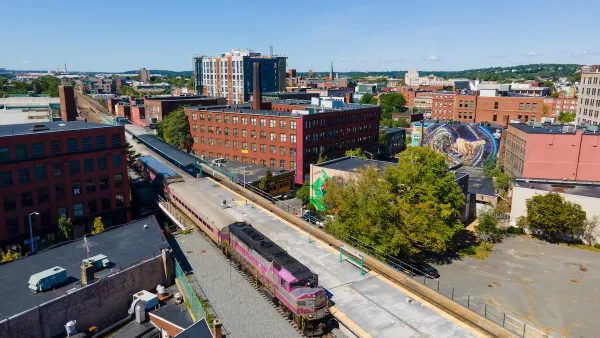The county council approved the much-debated long-range growth plan, preparing the region for a shift toward more mid-density housing and transit-oriented development.

In an update on a recent story, the Montgomery County Council approved the Thrive 2050 plan, which supports increased density in an effort to make housing in the region more affordable and inclusive. Katherine Shaver covers the story for the Washington Post, writing, “The vote ends a contentious three-year period for the state’s most-populous county as the proposal divided residents, with both sides arguing quality of life was at stake.”
While the plan itself doesn’t enact any changes in the county’s zoning code, “council members have said zoning changes will be necessary to enact the plan’s vision of making the Maryland suburb of 1.1 million residents more economically vital and environmentally resilient while less segregated by race and income.”
The plan intends to focus development along transit lines and major activity centers and transportation corridors to accommodate the region’s growth and reflect the diverse needs of its residents. Supporters see the plan as a step toward alleviating the housing crisis and creating a more walkable, sustainable region. Detractors worry that new zoning regulations could spur displacement and strain local infrastructure.
The council also plans to appoint new members to the county’s planning board, who all resigned earlier this month, this week.
FULL STORY: Montgomery council approves 30-year plan for denser development

Planetizen Federal Action Tracker
A weekly monitor of how Trump’s orders and actions are impacting planners and planning in America.

San Francisco's School District Spent $105M To Build Affordable Housing for Teachers — And That's Just the Beginning
SFUSD joins a growing list of school districts using their land holdings to address housing affordability challenges faced by their own employees.

The Tiny, Adorable $7,000 Car Turning Japan Onto EVs
The single seat Mibot charges from a regular plug as quickly as an iPad, and is about half the price of an average EV.

With Protected Lanes, 460% More People Commute by Bike
For those needing more ammo, more data proving what we already knew is here.

In More Metros Than You’d Think, Suburbs are Now More Expensive Than the City
If you're moving to the burbs to save on square footage, data shows you should think again.

The States Losing Rural Delivery Rooms at an Alarming Pace
In some states, as few as 9% of rural hospitals still deliver babies. As a result, rising pre-term births, no adequate pre-term care and "harrowing" close calls are a growing reality.
Urban Design for Planners 1: Software Tools
This six-course series explores essential urban design concepts using open source software and equips planners with the tools they need to participate fully in the urban design process.
Planning for Universal Design
Learn the tools for implementing Universal Design in planning regulations.
Smith Gee Studio
City of Charlotte
City of Camden Redevelopment Agency
City of Astoria
Transportation Research & Education Center (TREC) at Portland State University
US High Speed Rail Association
City of Camden Redevelopment Agency
Municipality of Princeton (NJ)





























